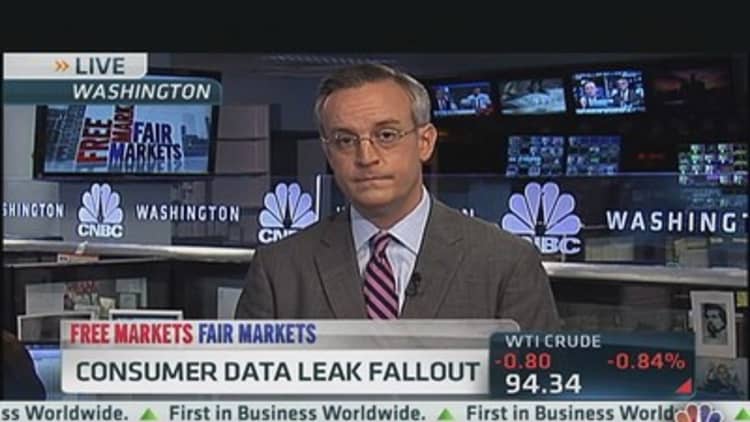The Conference Board, a research group that publishes market-moving economic data, announced Thursday that it will stop the practice of giving members of the news media early information as a result of concerns that it is creating an "unlevel playing field" in financial markets.
Citing "indications that our embargoed data is being diverted," the Conference Board wrote media members Thursday about "the blurring of lines between news outlets and data providers, and an ongoing advantage for trading measured in milliseconds." The group said it had concluded that the traditional media embargo system had become "impossible to monitor with any legal or technological clarity."
The announcement follows a May 28 report by CNBC detailing an unusual trading pattern about a quarter of a second ahead of the Conference Board's release that day. In the era of superfast computer trading, a quarter of a second is more than enough time for high-speed traders to scoop up profits ahead of the rest of the market.
On that day, the Conference Board told CNBC "there was no breach of information," and a spokesman expressed surprise at CNBC's questions, saying, "Frankly, we have not received any phone calls on this."
(For CNBC's earlier coverage, click here.)
But on Thursday, the group said its policy change is a response to a new, high-speed trading landscape. Conference Board CEO Jon Spector said it was notified Tuesday by one "media organization" that it had inadvertently released Conference Board data about 250 milliseconds early recently because of a problem with coordinating its clock. He declined to disclose which organization had accidentally released the data.
"We became uncomfortable with the fact that we could not really control what was going on," Spector said. "There was clearly an opportunity that people could be using it to trade in advance. And whether we could prove that was happening or not, we were concerned about a perception that people could be trading on it."
The Conference Board publishes a Consumer Confidence Index and other economic reports. In the past, the information was given under embargo to members of the media at 9:30 a.m. for a 10 a.m. release time to allow reporters time to prepare their stories. But in recent years, several media companies have gotten into a lucrative side business of distributing high-speed feeds of economic data in a format fit for computerized algorithmic trading in milliseconds.
That is the activity the Conference Board said causes concern.
"The Conference Board has been following this issue for the past few months, and concluded it is no longer certain that we can police the embargo program in a way that is fair, transparent, and in keeping with the public's trust," Spector said.

The letter to media organizations was signed by Communications Director Ralph Piscitelli. In it, he described a new release procedure in which information will be emailed directly to media outlets at 10:00 a.m. on release days, at which time a press release and historical data will be available to download on a secure FTP server. The release also will be put out over the PR newswire.
(Read More: Thomson Reuters Gives Elite Traders Early Advantage)
"We greatly value the relationships we have with our media partners, and hope you will continue to cover the release of our economic indicators as you have in the past," Piscitelli wrote.
During the May 28 trading event, data provided to CNBC by Nanex LLC show that trading exploded in the SPY ETF at 9:59:59 and 754 milliseconds, sending prices sharply upward. Trading volume soared from almost nothing to nearly 20,000 shares in the milliseconds that followed. There were three distinct bursts of trading volume over the course of the next 50 milliseconds—all well before the official release time of 10 a.m.
Nanex's Eric Hunsader wrote in a blog post that day that activity exploded one millisecond earlier in Chicago futures trading than in stocks, which are traded in New York. Because light takes four or five milliseconds to travel between the two cities, the twin spikes could not be a response to each other. Instead, Hunsader reasoned, "this was more likely the result of a timed trade in both futures and stocks, rather than an arbitrage reaction between the two."
That is, because information can't travel faster than the speed of light, Hunsader concluded that a trader likely preprogrammed computers to execute those trades in advance, with trading timed in both cities for that millisecond.
On May 28, the SEC declined to comment to CNBC about the unusual trading activity that day.
Piscitelli at the Conference Board wrote that the policy change will be effective as of the board's June 25 data release.
—CNBC's Eamon Javers


